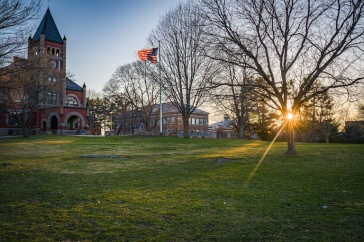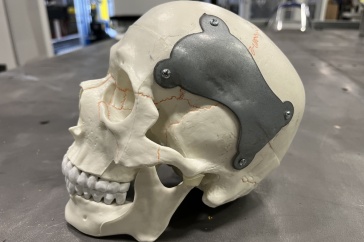
This is what the 3MT looked a few years ago. For the second year running, it was held virtually.
For the second time, University of New Hampshire students took to Zoom to compete in the annual 3 Minute Thesis (3MT) competition. The 3MT, held every spring at UNH since 2016, is an opportunity for graduate students to develop their public speaking and research communication skills while informing a public audience about their graduate scholarship. Though the ongoing Covid-19 pandemic ensured the event would be held virtually for the second year in a row, organizers and students are celebrating a smashing success.
“This is the same scenario we found ourselves in last year. I will say, however, that we had a little more warning this year!” said dean of the Graduate School Cari Moorhead in her opening remarks. “We’ve become experts in all things Zoom.”
The first rounds of the 3MT were held March 30 and 31, culminating in the finals held on April 21st. Eleven graduate students from a range of departments — including creative writing, chemical engineering, computer science, and more — condensed their research into three-minute presentations with a single PowerPoint slide. The presentations were then judged by a panel of professors, administrators and industry leaders based on comprehension, content, engagement, and communication.
While the task at hand may seem straightforward, the difficulty to condense years of research into three minutes is very real. Not only that, but participants need to engage an audience, a challenge that Moorhead stressed as particularly difficult through the screen.
“The students have had to step up quite considerably,” Moorhead said. “It’s a lot harder than you think!”
However, the participants in this year’s competition, six of whom were chosen to advance to the final round, proved more than up to the task. Coming in first place was David Heit, a master's student in the natural resources department focusing on wildlife & conservation biology. His thesis work tackles the question of how we can best understand the movements and habitat preferences of the white-tailed deer. By using tracking data and altering the scope of the maps of his research, Heit is helping to discover how we here in New Hampshire can safely cohabitate with our state animal.
“You always learn more about your own research when you try to explain it to somebody in accessible terms. And I learned a lot,” said Heit of the experience. “It’s really easy as a graduate student, especially in something quantitative to stay in your discipline… So it’s great seeing what the grad students here at the university are doing. Especially since we’ve also been disconnected due to Covid.”
Rounding out the top three were second place winner Via D’Agostino, a creative writing student who spoke on the intersection between feminism, environmentalism, and the experience of the Romani people, and third place winner Hannah Lightcap, a PhD student in psychology who presented her research into the role of personal intelligence in the achievement of health goals.
“I just loved this experience because it was challenging and fulfilling to be able to speak with brevity, then make a script, then memorize it, then mess up! All of that is really good because it’s humbling and exciting.” said Lightcap with a laugh. She, along with most of the other finalists, took part in a series of workshops to help her hone her skills and prepare for the main event. “I had a wonderful time. I will definitely do it again and recommend it to all my fellow grad students.”
With support from the 603 Challenge, this year’s event was organized by Jovana Milosavljevic-Ardeljan and Caroline Kanaskie, who also led the preparatory workshops. The workshop series included comprehensive support from creating the 3MT script, to designing the PowerPoint slide and practicing presenting. Thanks to their efforts, this year’s 3MT reached its broadest audience ever.
While the making a connection with an audience through a screen was an additional hurdle for competitors, the virtual format also provided unique opportunities. Graduate students from UNH’s Manchester campus were able to compete alongside their Durham peers. Additionally, there was no limit to the number of viewers who tuned in from around the globe. Jess Flarity, a PhD candidate in English literature, won the People’s Choice award for his analysis of feminism through the lens of American science fiction.
This year’s judging panel included three members of the UNH community: university president James Dean, Julie Simpson of UNH’s research integrity services, and Ivo Nedyalkov of the mechanical engineering department. Joining them were Mark Bayer, former US senate chief of staff and nonprofit consultant, Bob Baines, director of the education reform initiative STEAM Ahead NH, and Mike Maloney, the vice president of the real estate development firm The RiverStone Group, who generously sponsored the event for the second time. Each finalist took home a prize of at least $100 for their hard work.
“I felt everybody did a nice job of pinpointing exactly what their research was, and how it was different from sort of the prevailing wisdom or the scholarship that had been done before,” said Bayer of the presenters.
“Being able to speak concisely and enthusiastically—this is something that will just stand you in good stead throughout your careers, wherever you go,” added President Dean. “And you've all demonstrated this just across the board. Really impressive.”
2021 3MT Winning Presentations
- David Heit “What Habitat Matters Most to Deer?” (1st place; MSc Natural Resources: Wildlife & Conservation student)
- Via D'Agostino “All the Scattered Stars: Feminism, Environmentalism, and the Rights of the Romani People” (2nd place; MFA in Creative Writing, Fiction student)
- Hannah Lightcap “Achievement Unlocked: How Personal Intelligence Might Predict Health Goal Success” (3rd place; PhD Psychology student)
- Jess Flarity “Awakening to Vulnerability: Feminism and 20th Century American Science Fiction” (People’s Choice Winner; PhD English Literature student)
- Benjamin Savard, ‘23
















































